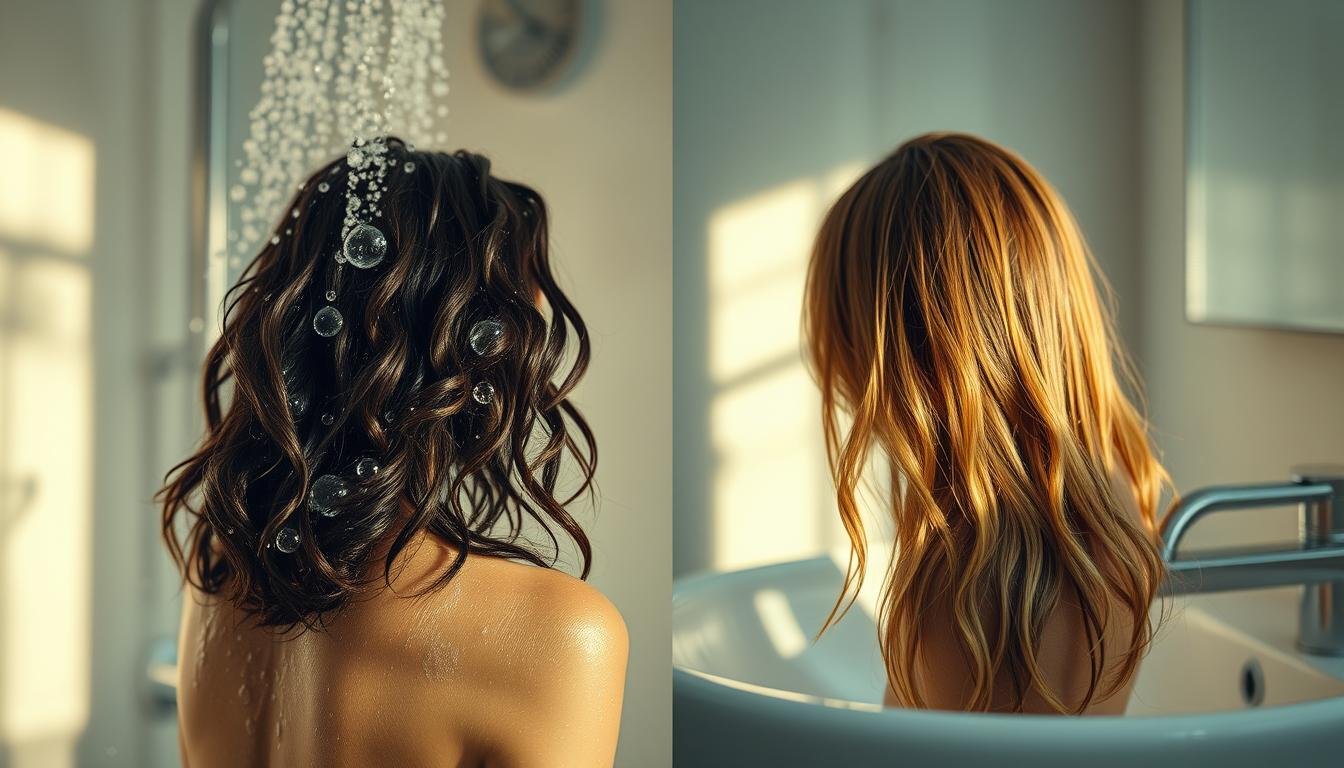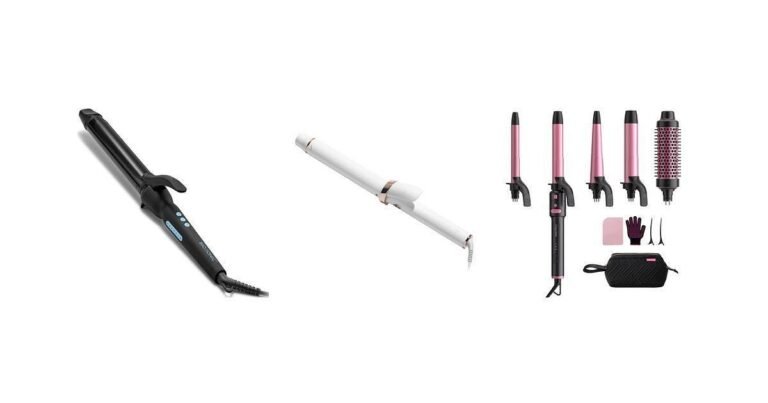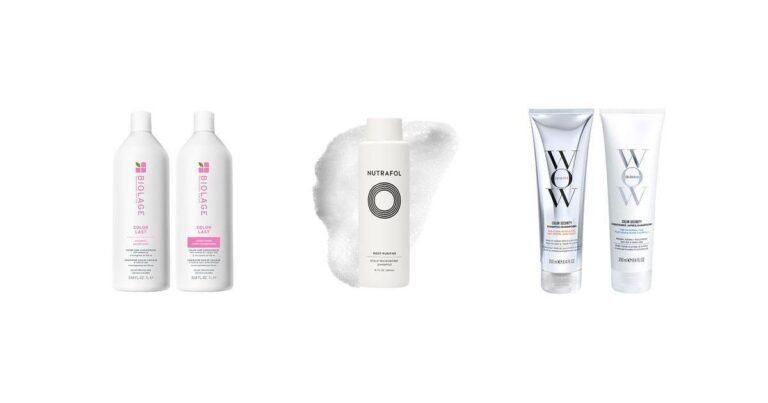How Often Should I Wash My Hair?
Did you know that teenagers and adults in their 20s to 30s produce more sebum, the natural oil that keeps hair healthy, than older adults? This surprising fact highlights the wide range of hair washing frequency needs across different age groups and hair types. The hair-washing debate has raged on for years, with some swearing by daily washing and others opting for weekly rinses. Understanding your hair’s unique characteristics is key to finding the optimal shampoo routine for healthy, vibrant tresses.
Hair experts generally agree that washing your hair every day is unnecessary for most people. In fact, over-washing can lead to dryness, Damage, and split ends, particularly for those with tight curls or coarse hair textures. On the other hand, not washing frequently enough can result in a greasy appearance, unpleasant odors, dandruff, and an itchy scalp. The ideal frequency depends on factors such as hair type, activity level, and product use.
Key Takeaways
- Hair type is a significant factor in determining how often you should wash your hair.
- Younger individuals tend to produce more natural oils, requiring more frequent washing.
- Over-washing can strip hair of its natural oils, leading to dryness and Damage.
- Frequency of hair washing depends on individual factors like oiliness, activity level, and product use.
- Experts recommend against daily washing for most people, with guidelines varying based on hair type.
Understanding Your Hair Type
When it comes to hair care, understanding your hair type is crucial in determining the optimal washing frequency. Hair type not only affects how quickly your hair becomes oily or dry but also influences the needs of your scalp. Proper identification and consideration of your hair type can help you develop a Hair Care routine that keeps your locks healthy and vibrant.
Fine Hair vs. Thick Hair
People with fine, straight hair (type 1) are recommended to wash their hair two to three times a week to combat oil buildup. On the other hand, individuals with thicker, coarser hair can typically go longer between washes, with a recommendation of washing every one to two weeks.
Curly Hair vs. Straight Hair
Individuals with wavy to curly hair (type 2 or type 3) are advised to wash their hair about once a week, possibly twice at most, to maintain hydration. For those with coily hair (type 4), including classifications 4A, 4B, and 4C, weekly washes are recommended to prevent stripping of oils needed for hydration.
Oily Scalp vs. Dry Scalp
Hair experts agree that washing hair every day is excessive and can lead to dryness, loss of shine, and disruption of the scalp microbiome and pH balance. However, an oily scalp may require more frequent washing, while a dry scalp may benefit from less frequent washing to maintain the natural oils. Buildup of oil on the scalp can lead to skin concerns such as acne and hair loss, while infrequent washing can result in oil buildup that may lead to psoriasis, alopecia, and dandruff.
| Hair Type | Recommended Washing Frequency |
|---|---|
| Fine, Straight Hair (Type 1) | 2-3 times per week |
| Wavy to Curly Hair (Type 2 or 3) | About once a week, possibly twice |
| Coily Hair (Type 4) | Weekly |
| Thick, Coarse Hair | Every 1-2 weeks |
Proper cleansing of the scalp promotes circulation, scalp stimulation, and relaxation, in addition to maintaining healthy hair. Age, genetics, and environment can also affect oil production, with teenagers and young adults producing more sebum than older adults.
Remember, your hair type and scalp condition are unique, so it’s important to experiment and find the right washing frequency that works best for you.
Factors That Influence Hair Washing Frequency
Your hair washing routine is influenced by a variety of factors, from your lifestyle and activity level to the environmental impact and hair products you use. Understanding how these elements affect your hair can help you establish a healthy, personalized washing regimen.
Lifestyle and Activity Level
Your daily activities and lifestyle play a significant role in determining how often you should wash your hair. People with oily hair or who use Hair Care products daily should consider washing their hair once every 1–2 days. On the other hand, those with dry hair can wash their hair less frequently. Individuals with textured or coily hair should only wash it once every 1–2 weeks. Factors like exercise, sweat, and exposure to pollutants can also necessitate more frequent washing to keep your hair and scalp clean.
Environmental Impact
The environment you live in can significantly impact your hair washing needs. City dwellers, for instance, may need to wash their hair more often due to increased exposure to air pollution. Outdoor activities like hiking or spending time in nature can also expose your hair to pollen, affecting those with allergies and requiring more frequent washing.
Product Use
The hair products you use, such as styling creams, oils, and gels, can contribute to the frequency of your hair washing routine. Heavy product use may require more frequent washing to prevent buildup and irritation on the scalp. Choosing the right products for your hair type is crucial – lightweight products are better suited for oily hair, while hydrating products are more suitable for dry hair.
| Hair Type | Recommended Washing Frequency |
|---|---|
| Fine or Thin Hair | Up to 1 day between washes |
| Medium Hair | Up to 2 days between washes |
| Thick or Coarse Hair | Every 3-4 days |
By understanding the factors that influence your hair washing frequency, you can create a routine that keeps your hair and scalp healthy and balanced.

“Washing your hair too frequently can lead to overproduction of sebum and oil, while not washing enough can result in buildup and irritation.”
General Guidelines for Washing Hair
The frequency of hair washing can greatly impact the health and appearance of your tresses. While there’s no one-size-fits-all approach, understanding your hair type and lifestyle can help you find the right balance.
Daily Washing: Pros and Cons
Daily hair washing may be necessary for those with an oily scalp, as it can help remove excess sebum and prevent buildup. However, washing too often can strip the hair of its natural oils, leading to dryness and brittleness.
Washing Once a Week: Benefits
For individuals with dry, curly, or color-treated hair, washing just once a week can be beneficial. This helps preserve the natural oils that keep hair healthy and hydrated. Those with textured or curly hair can even go up to five to seven days between washes if it suits their lifestyle.
Finding a Balanced Routine
The ideal hair washing frequency ultimately depends on your hair type and lifestyle. A good rule of thumb is to leave at least two to three days between washes. Additionally, incorporating the right hair care products, such as gentle, sulfate-free shampoos and nourishing conditioners, can help maintain a healthy scalp and vibrant hair.

Remember, the key is to listen to your hair and scalp, and adjust your routine accordingly. With a bit of experimentation, you can find the perfect balance for your hair washing frequency and achieve the healthy, beautiful locks you desire.
The Role of Climate in Hair Care
The climate you live in plays a significant role in determining your hair care needs. From the humid, sweltering summers to the dry, bitter winters, environmental factors can significantly impact the health and appearance of your locks. Understanding how your hair responds to various climatic conditions is crucial for maintaining a healthy, vibrant mane all year round.
Humidity and Its Effects
High humidity levels can be a double-edged sword for your hair. While it may add some much-needed moisture, it can also lead to frizz, tangling, and a general lack of manageability. Hydrating shampoos and conditioners are recommended for desert climates to maintain hair moisture levels. Regular deep conditioning treatment is Essential in humid climates to keep hair hydrated and soft. On the other hand, low humidity can strip your hair of its natural oils, leading to dryness, brittleness, and increased Breakage.
Seasonal Changes and Hair Health
As the seasons change, so too do the demands on your hair. Over-washing hair can strip away natural oils, so it is advised to wash hair less often in dry climates. Warmer climates can promote faster hair growth due to increased circulation and metabolic rate. Moderate climates with balanced humidity and temperature are generally best for hair growth. In the winter, the cold, dry air can be detrimental to your hair, leading to dryness, static, and increased breakage. Adapting your hair care routine to these seasonal shifts is crucial for maintaining healthy, vibrant hair throughout the year.
Weather conditions have an impact on hair behavior; humidity can lead to frizz while dry weather can cause brittleness and breakage. For curly hair in dry climates, hydrating treatments like Cécred’s Moisturizing Deep Conditioner are recommended to prevent breakage and maintain softness. Cécred’s Moisture Sealing Lotion is a recommended product to reduce frizz and define curls in humid climates.
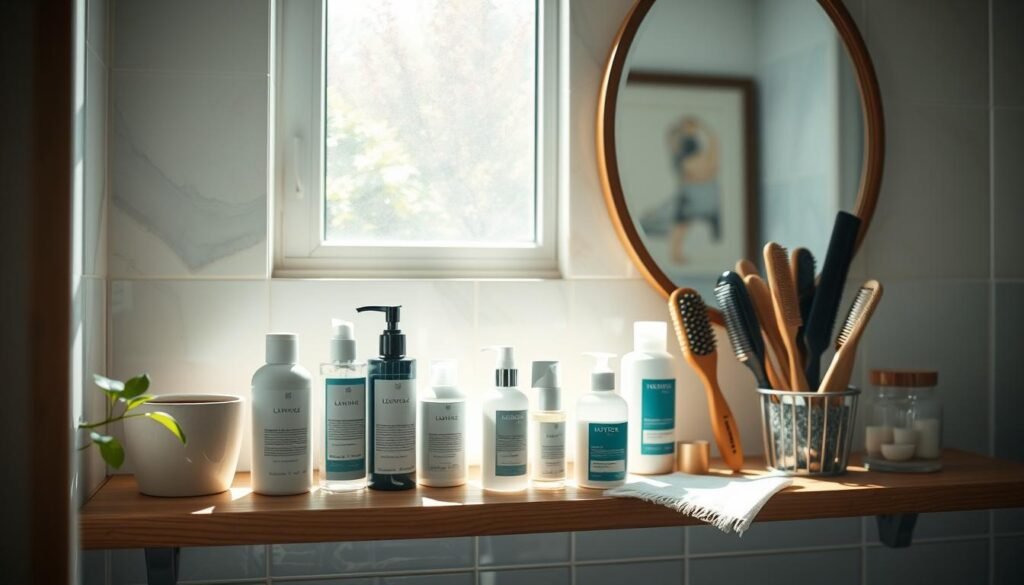
“Understanding how your hair responds to various climatic conditions is crucial for maintaining a healthy, vibrant mane all year round.”
By recognizing the impact of climate on your hair, you can tailor your hair care routine to address the specific needs of your locks, ensuring they remain strong, healthy, and resilient in the face of ever-changing environmental factors.
Hair Types and Recommended Washing Frequency
Maintaining a healthy hair care routine starts with understanding your unique hair type and adjusting your shampoo frequency accordingly. Whether you have normal, color-treated, or dry and damaged hair, there are specific guidelines to help keep your locks looking their best.
Normal Hair
People with normal or medium hair types typically benefit from washing their hair every 2-3 days using a gentle, sulfate-free shampoo. This frequency helps maintain the natural oils that keep hair healthy and hydrated, while preventing the buildup that can lead to oiliness or dryness.
Color-Treated Hair
For those with color-treated hair, it’s Essential to be more mindful of washing frequency to preserve the vibrancy of the color. The recommendation is to wash color-treated hair 2-3 times per week using a shampoo formulated for color-treated hair. This helps lock in the color and prevent it from fading prematurely.
Dry or Damaged Hair
Individuals with dry, damaged, or brittle hair should aim to wash their hair less frequently, about 1-2 times per week. Using a moisturizing, sulfate-free shampoo and incorporating protein-based treatments can help strengthen and repair the hair. Bond-building products like Olaplex or K18 can also be beneficial in restoring the health of fried or chemically-treated hair.
| Hair Type | Recommended Washing Frequency |
|---|---|
| Normal Hair | Every 2-3 days |
| Color-Treated Hair | 2-3 times per week |
| Dry or Damaged Hair | 1-2 times per week |
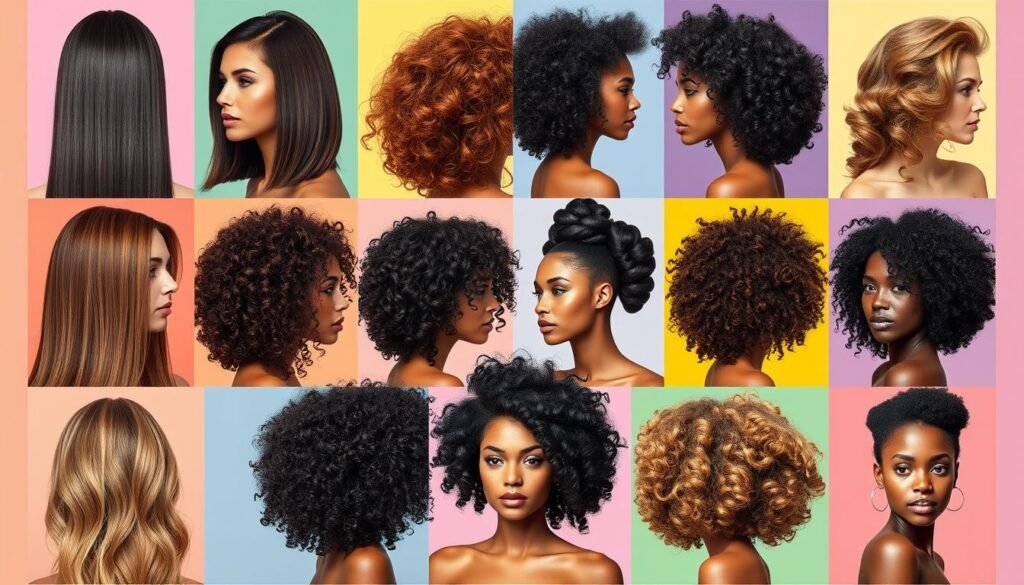
Remember, the optimal shampoo routine for your hair type may also be influenced by factors like lifestyle, climate, and product use. Staying mindful of your hair’s needs and adjusting your shampoo frequency accordingly can help you maintain healthy, vibrant hair.
Tips for Maintaining Healthy Hair
Achieving and maintaining healthy, vibrant hair requires a delicate balance of care. From choosing the right shampoo to incorporating nourishing treatments, these tips can help you keep your locks looking their best.
Choosing the Right Shampoo
Select a shampoo tailored to your hair type and concerns. Opt for sulfate-free formulas, which are gentler on hair and won’t strip away essential oils. If you have an oily scalp, consider using a clarifying shampoo every other week to remove buildup.
Incorporating Conditioners
Condition your hair every time you shampoo to replenish moisture and improve manageability. For dry or damaged hair, use a deep-conditioning treatment or hair mask once a week for an extra boost of nourishment. Curly-haired individuals may benefit from co-washing or using apple cider vinegar rinses to keep their locks hydrated.
Hair Treatments and Masks
Incorporate weekly hair treatments or masks to address specific concerns. Protein-rich treatments can help strengthen and repair damaged hair, while moisturizing masks can infuse dry strands with much-needed hydration. Scalp treatments can also be beneficial, helping to soothe and nourish the skin between washes.
| Hair Type | Recommended Washing Frequency | Additional Tips |
|---|---|---|
| Oily or Straight Hair | Daily | Use a clarifying shampoo periodically to remove buildup |
| Normal to Dry Hair, Wavy Hair, or Chemically Treated Hair | 2-3 days between washes | Condition hair every wash to replenish moisture |
| Natural Hair | A few times per month | Consider co-washing or using apple cider vinegar rinses |

Remember, the optimal hair washing frequency can vary depending on your individual hair type, texture, and lifestyle. Experiment with different Routines to find the one that works best for your hair care tips, hair hygiene, and hair products.
Signs You Need to Wash Your Hair
Maintaining proper hair hygiene is crucial for the health and appearance of your locks. While there’s no one-size-fits-all approach to hair washing, there are certain telltale signs that indicate it’s time to lather up. Recognizing these cues can help you develop a personalized scalp condition and hair care tips routine for optimal results.
Oily Scalp Indicators
One of the most obvious signs that your hair needs washing is an oily scalp. If your roots appear greasy and your hair looks flat, it’s likely time for a wash. An itchy, irritated scalp can also be a sign of excess oil buildup. Proper cleansing with the right shampoo can help regulate sebum production and restore balance to your scalp.
Dull Hair Symptoms
In addition to an oily scalp, dull, lifeless hair is another indicator that a wash is overdue. If your strands lack shine and vibrancy, and you’re struggling to style them, it’s a clear sign that your hair is in need of a refresh. Washing your hair can help remove product buildup, revive your hair’s natural luster, and make it more manageable.
Other signs that it’s time to wash your hair include unpleasant odors, visible dirt or debris, and scalp acne – which may warrant the use of an exfoliating shampoo. If your hair feels heavy or weighed down, that’s another cue that a wash is needed to restore its bounce and volume.
Paying attention to these hair hygiene signals can help you maintain a healthy scalp and vibrant, manageable hair. By adjusting your washing frequency based on your individual needs, you can achieve the perfect balance for your scalp condition and hair type.
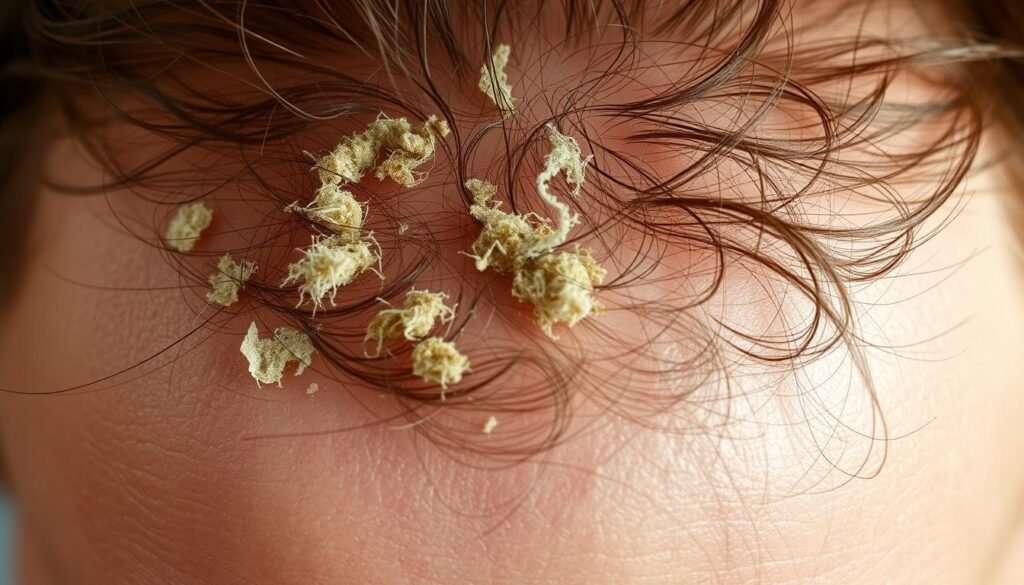
“Proper hair washing is essential for maintaining a healthy scalp and beautiful, manageable hair.”
The Importance of Scalp Health
Maintaining a healthy scalp is crucial for promoting optimal hair growth and overall hair hygiene. The scalp is the foundation of our hair, producing sebum that helps moisturize and protect the strands. When the scalp is in good condition, it can support stronger, healthier hair. Conversely, neglecting scalp health can lead to various issues, such as dandruff, dryness, and even hair loss.
Understanding the Scalp’s Role
The scalp plays a vital role in hair health. It is the source of sebum, a natural oil that conditions and safeguards the hair. A well-balanced scalp environment promotes optimal hair growth and prevents common problems like flakiness, redness, and itchiness. Maintaining a healthy scalp is essential for achieving the best possible hair quality and appearance.
Simple Scalp Care Tips
- Gently massage the scalp during hair washing to stimulate circulation and remove buildup.
- Use scalp-specific treatments, such as pre-shampoo oils or exfoliating scrubs, to address any concerns like dryness or dandruff.
- Avoid harsh chemicals and excessive heat styling, which can disrupt the scalp’s natural balance.
- Exfoliate the scalp periodically to prevent the accumulation of dead skin cells and product residue.
By incorporating these simple scalp care practices into your hair routine, you can help maintain a healthy, nourished scalp and promote the growth of strong, vibrant hair.
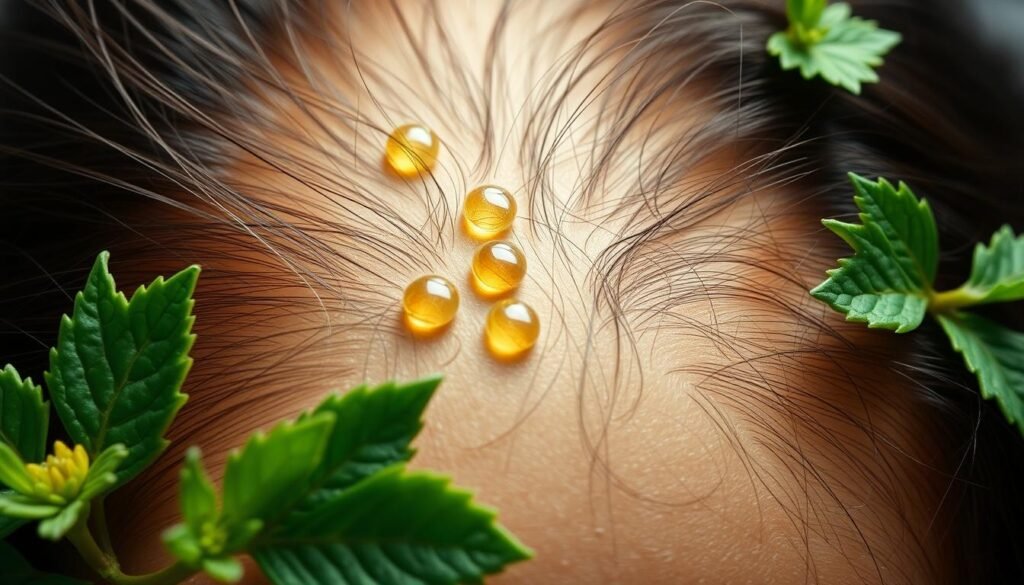
Remember, addressing any scalp issues, such as dandruff or dryness, is essential for overall hair health and well-being. A healthy scalp lays the foundation for beautiful, resilient hair.
Alternative Hair Care Methods
While traditional shampoo Routines have been the norm for many, alternative hair care methods are gaining popularity for their potential benefits. Two such methods that are worth exploring are dry shampoo and co-washing.
Dry Shampoo and Its Benefits
Dry shampoo is a game-changer for those seeking to extend the time between washes. It works by absorbing excess oil and grease from the scalp, allowing you to skip a full wash. This can be particularly useful for individuals with oily hair types. In fact, one person has gone without using shampoo for an impressive 4.5 years, indicating a long-term commitment to alternative hair care methods.
Co-Washing: What You Should Know
Co-washing, or washing hair with conditioner instead of shampoo, is another alternative method that can benefit certain hair types. This approach helps maintain the natural oils and moisture in the hair, making it a good option for those with curly or dry hair. The transition period from traditional shampooing to alternative methods can vary from 10 days to 6 months for some individuals, emphasizing the need for patience during the adjustment phase.
In addition to dry shampoo and co-washing, some individuals have found success with apple cider vinegar rinses, which can help balance the scalp’s pH and remove product buildup. These alternative methods can complement traditional washing routines, providing a more customized approach to hair care.
When exploring alternative hair care, it’s important to experiment and find what works best for your unique hair type and needs. Brushing hair with a boar bristle brush, for example, is recommended as a significant factor in the no-poo method, promoting circulation and distributing natural oils for healthier hair. Additionally, paying attention to healthy eating habits can play a key role in maintaining healthy hair, as there is a strong connection between diet and hair health in alternative hair care methods.
Remember, the effectiveness of alternative hair care methods can vary from person to person, so it’s crucial to be patient and persistent in finding the right approach for you. By incorporating these alternative techniques, you may discover a more personalized and potentially healthier way to care for your hair.
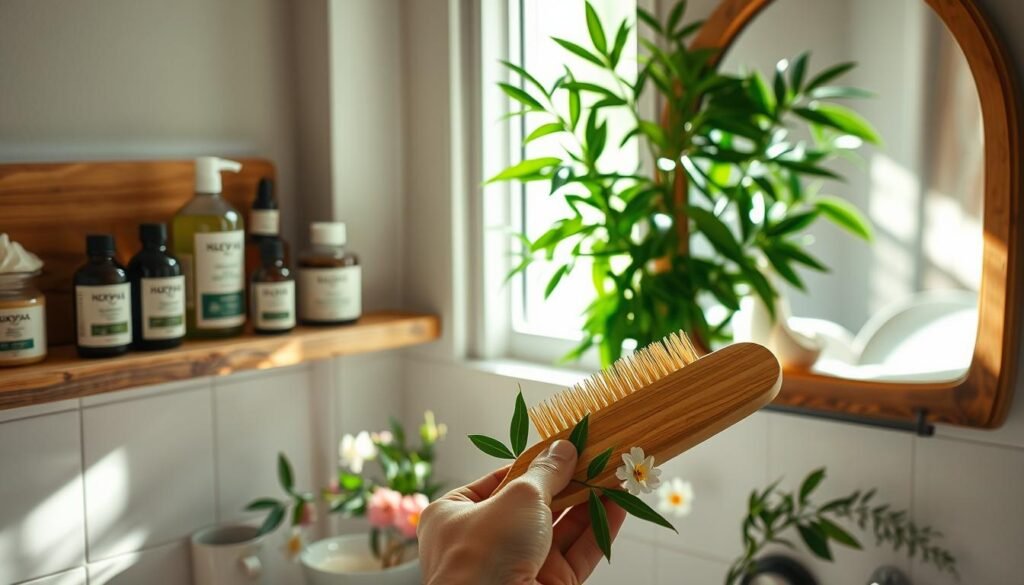
Expert Recommendations and Myths
When it comes to hair washing, there are several common misconceptions that often confuse people. Contrary to popular belief, daily washing is not always necessary, and frequent washing does not directly cause hair loss. In fact, experts like dermatologist Geeta Yadav emphasize the importance of scalp exfoliation for hair growth and overall scalp health.
Common Misconceptions About Hair Washing
One prevalent myth is that hair should be washed every day. However, the frequency of washing often depends on an individual’s hair type and lifestyle. While fine hair textures may require daily washing due to higher oil gland production, coarse hair textures can typically go longer between washes. Another misconception is that shampoo is inherently detrimental to hair health, which is not the case when the product is used appropriately for one’s hair type.
Advice from Hair Care Professionals
Hair care professionals, such as hairstylist Miles Jeffries, recommend co-washing for curly hair types to maintain moisture and prevent dryness. Additionally, dermatologist Iris Rubin advises the use of non-irritating, fragrance-free products for individuals with sensitive scalps. Ultimately, professionals stress the importance of tailoring washing frequency and products to individual hair types and lifestyles, rather than adhering to a one-size-fits-all approach.
FAQ
How often should I wash my hair?
The frequency of hair washing can vary depending on your hair type, scalp condition, and lifestyle. While there is no one-size-fits-all answer, experts generally recommend washing hair every 2-3 days for normal hair types.
What factors influence hair washing frequency?
Hair type, lifestyle, environment, and product use are all factors that can affect how often you need to wash your hair. Fine hair tends to get greasy faster, while thicker hair can go longer between washes. Activities like exercise and exposure to pollution may also require more frequent washing.
Is daily hair washing necessary?
Daily hair washing is generally not necessary for most people and can actually cause damage, leading to dry, brittle, and dull hair over time. However, some individuals with very oily hair may need to wash their hair daily to maintain a clean, fresh appearance.
How does hair type affect washing frequency?
Hair type plays a significant role in determining how often you should wash your hair. Fine hair may need washing every 1-2 days, medium hair every 2-4 days, and thick hair from once to every two weeks. Curly hair often requires more moisturizing and less frequent washing.
How does climate impact hair washing needs?
Climate can greatly influence your hair washing routine. Humid environments may increase oil production and require more frequent washing, while dry, cold climates may necessitate less frequent washing to prevent stripping natural oils.
what are the signs that it’s time to wash my hair?
Indicators that it’s time to wash your hair include a greasy or oily scalp, flat and lifeless hair, unpleasant odors, visible dirt or product buildup, and an itchy or flaky scalp.
How important is scalp health for hair care?
The scalp plays a crucial role in hair health. It produces sebum, which moisturizes and protects the hair. Maintaining a healthy scalp through gentle washing, exfoliation, and using appropriate products is essential for promoting better hair growth and overall hair quality.
Are there any alternative hair washing methods I can try?
Yes, there are several alternative hair washing methods that can complement your traditional routine. These include using dry shampoo to absorb excess oil between washes, co-washing (washing with conditioner), and apple cider vinegar rinses to balance scalp pH and remove buildup.
What are some common misconceptions about hair washing?
Some common misconceptions include the need for daily hair washing and the belief that frequent washing Causes Hair loss. Experts emphasize the importance of tailoring washing frequency to individual hair types and lifestyles, as well as the benefits of scalp exfoliation for hair growth.
